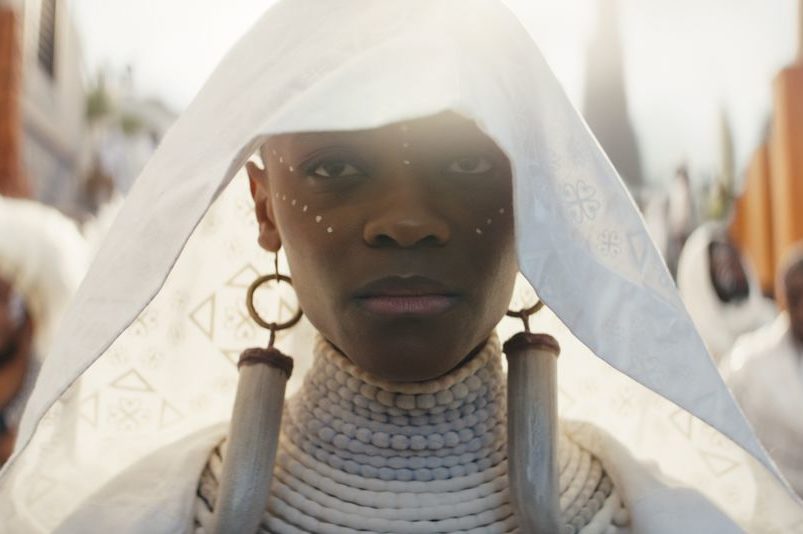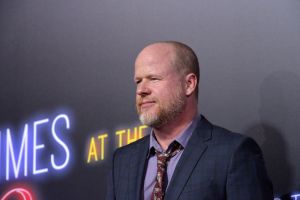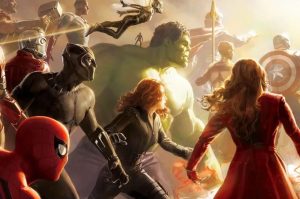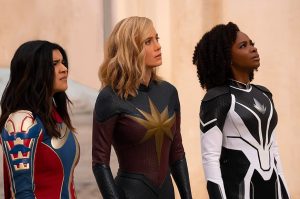Heading into this film, director Ryan Coogler confronted a virtually impossible situation: the sudden, tragic passing of his franchise’s leading man. Chadwick Boseman’s untimely 2020 death casts a long shadow over Black Panther: Wakanda Forever. The fact that the movie is coherent at all is remarkable.
That’s probably underselling things, though.
From an action standpoint, Wakanda Forever is a serviceable — if somewhat less inspired than its predecessor — Marvel epic. Beneath all the CGI, it’s a surprisingly meditative passing of the torch.
Following the death of King T’Challa (Boseman) from an unspecified illness, the cloistered Afrofuturist nation of Wakanda reels. Queen Ramonda (Angela Bassett) ascends the throne, while Princess Shuri (Letitia Wright), warrior Okoye (Danai Gurira) and T’Challa’s love interest Nakia (Lupita Nyong’o) struggle to discern their paths forward.
They don’t have much time to mourn. The global superpowers of the world are searching for vibranium deposits, troves of the powerful resource that won’t require them to deal with the stern Wakandans. And when one vibranium expedition appears to prove successful, Wakandan authorities get involved to protect their national distinctive. Shuri and Okoye end up on a globe-trotting mission to protect young scientist Riri Williams (Dominique Thorne) — the original developer of the expedition’s vibranium detector —from the powers that would conscript her.
Wakanda isn’t the only micronation profoundly altered by the mysterious metal. As it so happens, there’s also the underwater, Mesoamerican-inspired realm of Talokan, ruled by the superpowerful Namor (Tenoch Huerta Mejía): a people descended from survivors of the Spanish conquests. It turns out that the vindictive Namor plans to wage war against the surface world, and wants Wakanda to join him. If they don’t, he’ll start his purge with them. (This plot setup is strategically baffling: why would Namor risk losses in an unnecessary war against an isolationist country rather than stewarding warpower for a larger world conflict? This remains unexplained.)
Originality is not exactly Wakanda Forever’s strong suit. This same motif of anticolonial revolt was the thematic core of the first Black Panther, and it worked better there (thanks to Michael B. Jordan’s charisma). And the “underwater city against the world” plotline borrows liberally from 2018’s Aquaman. Frankly, a stronger story might have cast the Talokan people as a populace affected and damaged by runoff from Wakanda’s vibranium processing: what happens when Wakanda becomes a kind of unintentional aggressor?
The better parts of Wakanda Forever, though, aren’t the big battles, but the quieter moments where individual characters come to the fore. Early on, for example, it becomes clear that Shuri is a religious skeptic who questions the existence of the goddess Bast and the reality of the “Ancestral Plane” from which the Black Panther draws power. In one lingering scene, she coldly informs Queen Ramonda that her feelings of T’Challa’s presence are merely “a construct of her mind.” It’s a position she’s forced to reevaluate as the film unfolds. And while the subplot is never quite given as much space to breathe as one would like, it’s an interesting counterexample to Spencer Klavan’s recent thesis that the theology of Marvel is basically grounded in the “multiverse.”
In the Black Panther series, there’s a real willingness to actually treat the sacred as the sacred — a willingness that isn’t present in most other installments.
And the crown jewel of Wakanda Forever is its stunning setting and art design, from the spires of Wakanda’s capital city to the softly lit causeways and ball courts of Talokan. These are visions of distinctly non-Western modernities — of what African and Mesoamerican cultures might’ve become, if given space and time to realize their own internal possibilities.
Just like its predecessor, Wakanda Forever paints a lush portrait of a civilization that refuses to play on Western terms. Wakanda is decidedly hostile to the other nations of the world, with strictly controlled borders and tight export restrictions. And that’s saying nothing of its hierarchical and religiously traditionalist social order, or its contempt for the United Nations. With a worldview like that, it’s rather surprising that this series is so widely applauded by left-liberal audiences; Wakanda itself is starkly postliberal in the most fundamental ways. Ultimately, that’s what makes it so mesmerizing to explore onscreen.
But is it worth the watch? Wakanda Forever may creak under its own weight, but, like the characters at its heart, it stays standing. This isn’t the most revelatory chapter of the MCU, thematically or otherwise, but the Panther’s claws are still pretty sharp.


















